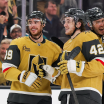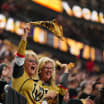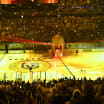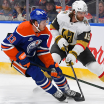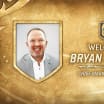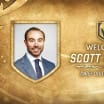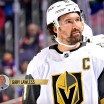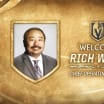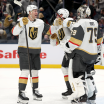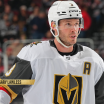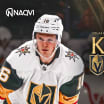Jon Cooper, as you read this, may very well be deciding on where he'll take the Stanley Cup next. The 30 other head coaches in the NHL, however, are plotting on how to knock crown off the collective heads of Cooper and the Tampa Bay Lightning.
That's life in pro sport. One organization goes home happy at the end of the season while the rest are stuck in the reality of not being champions. Or, in more blunt terms, losers. One can't have it both ways. Second place and everything below it does not equate to winning.
Q&A With Head Coach Pete DeBoer
Hear DeBoer's thoughts on the upcoming season, roster additions, changes
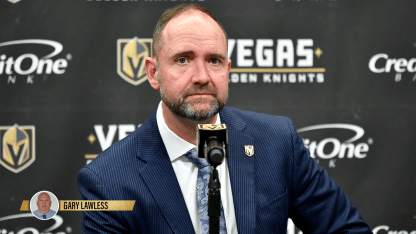
By
Gary Lawless
VegasGoldenKnights.com
Vegas Golden Knights coach Pete DeBoer squeezed a lot out of his team this year after taking over the club in January. Ultimately, however, the organization fell short of its goal. DeBoer must now adjust to new players and fresh dynamics placed upon the NHL in these pandemic days. Lots remains unknown. One constant is the goal of owner Bill Foley and everyone on down to win the Stanley Cup. That is DeBoer's task.
We caught up with the coach Thursday morning and here's the bulk of that conversation:
Gary Lawless: How do you see your playoff run after having the time to process?
Pete DeBoer: Any time there is a playoff, there is only one coach and one team walking out of there that is really happy. This year, it is Jon Cooper. The ironic thing is that last year they were probably the most devastated team on the planet after getting swept in the first round with the best regular season record. I think it gives one perspective of how hard it is to win and go on a deep run. How quickly you can recover and try to get to the next level by learning from what went right and what went wrong. I think Tampa was a great example of that. For us, the bubble experience was something that was really unique. It gave me an unbelievable opportunity to get to know our players. I didn't get a lot of time to spend with them when I came in. In mid-January, we were on the road for 10 games, had a few home games and then we got shut down. It was a real opportunity for me to get to know these guys intimately. It was a two-month road trip. I'm really glad we got to do it and I'm really hopeful that that will bear fruit. The fact that I know them better, they know me better, the road we went on, the wins and losses, the good and the bad. It's on all of us as a group to take that and make sure that we build on it for next year.
GL: Do you have a better perspective on why Dallas was able to beat your team?
PD:For sure. You look at the obvious reasons, but you have to remember Dallas beat Colorado too in the round before us. They gave everybody they played a really hard time with their style of play. For us, I thought we were pretty resilient in sticking with it, but when I look at what Tampa was able to do in the Finals against them, really it came down to finding a way to score an extra goal a night. For Tampa, in most of those four games they won, they scored at least one power-play goal every game. While our scoring went cold in general, a power-play goal a night in any of our games would have made a difference. Sometimes you have to find a different way. Sometimes you have to get a little fortunate. I loved how our team competed. I loved how we carried the game most of the nights against a really tough team. We have to find a way to score an extra goal a night.
GL:How do offseason acquisitions add up to more goals?
PD: Regardless of what we've done in free agency, that's the reality of the NHL. You never have the same roster two years in a row. George, Kelly and Bill Foley have done an unbelievable job of basically showing the mandate here is to win. Whatever tough decisions we have to make, whatever resources we have to use to give ourselves a chance to win, we're going to do that. Obviously the Pietrangelo situation was one of those situations. Knew there would be casualties by making that decision, but we do feel we're better overall. There are also young guys in the organization that are going to make a step. Despite the additions personnel-wise, I think we can be better. The reality was that the bubble training camp was my first opportunity to really work with this group. We didn't get implemented all the things we wanted to. I liked a lot of what we were doing. Our penalty kill really started to look like an elite penalty kill as we got through the bubble. We spent a lot of time on that when I took over our defensive play. It really tightened up to the point where we were giving ourselves the chance to win every single night in the playoffs against anybody we were playing and limiting them to 20-25 shots on net a night and out-chancing them. Our game was starting to get in really good places, but I'm looking forward to more time. A full training camp, some real practice time, an opportunity to do some of the things outside of personnel that I think we can do to help us create more offense and be a better team.
GL:What does Pietrangelo add to your group?
PD: I've got to know his game really well by coaching in the Western Conference. In San Jose, we played them twice deep in playoffs the five years I was there. Both in the conference final, actually. I've seen him in those situations and always walked away admiring how solid his game is at both ends of the rink. The other team just had a calmness to them when he was on the ice for those 25 minutes a night. You also can't underestimate the importance of the right shot. We had five lefts and one right this year for a lot of nights. To add another right shot really opens up some things for us, both at even strength and on the power play.
GL:What does Pietrangelo do for Theodore's game?
PD: It insulates Theodore a little bit. I think Theodore is obviously on everyone's radar now with how he's played. He's one of those guys now that every time you're playing Vegas you're going to circle his number on the board and he's going to get a lot of extra attention. The more guys that the other team has to circle, the less attention they can put on one or two guys. His benefit to Theodore, but also to a lot of other guys, is be able to free them up.
GL: The fans in Vegas obviously have a real special affinity for the group that was here the first year. When one of those guys is taken out of the picture it probably hurts a little more than it does in some other situations. You coach this team and you're around them, do you perceive any chemistry issues or will the leadership of a guy like Pietrangelo enhance what you have in your room?
PD: First off, you totally get where the fans are coming from. Special group, special year, something that won't ever be replicated again. At the same time, in pro sports you have to evolve. You have to get better. Guys move on, guys move up, young guys start to come in. We sit down at the end of every year and we sit down and say were we good enough to really win? If you weren't you have to try to make changes. As good as it feels to have the same people here every year, the goal is to win a Stanley Cup. There were some really tough decisions and some great men and some great people had to go out. At the same time, I would tell the fans George and Kelly and Bill have put a ton of stock in character. If they're moving out anybody with character, which the guys that left obviously had, the people they're bringing in have the same amount of character or they wouldn't be making those decisions. I'm looking forward to our new group. I think we've got some great leadership there. Pro athletes understand that you're not going to be with the same group every year and they want to win. I think if you sit down with Mark Stone and told him we've got to make some tough decisions personnel wise, but we think it'll give us a better chance to win, him and everyone else in that room would say yeah, let's go. That's what's happened.
GL: You have some young guys in particular, we'll talk about forwards first, Glass and Krebs. What do you expect from them this year?
PD: I'm excited to see them. We're going to need them. There's some opportunities there, specifically for centermen, in the organization in the forwards. But also on defense, too. I got to know the young guys in the bubble, too. It was a great education for me to be around Krebs on a day-to-day basis, to be around Nic Hague who's a real impressive kid. So I'm excited about the young guys. You look around the league and there's young guys playing important roles on a lot of teams. When I came in January we did that with Zach Whitecloud, we did that with Nic Roy. That list of guys we need to be this year's version of those guys who really helped us a lot in our run to the conference final.
GL: Do you have a board up with some lines up somewhere or is it too early for that?
PD: As a coach you're always throwing lines around, but we've still got some question marks. Cody Glass is still recovering. It's my understanding that it's going well and that he should be available and ready to go come training camp. Obviously Robin Lehner had some surgery in the summer, so we've got some health issues we're dealing with. And until I get that training camp roster of who's healthy and who's ready to play and who's ready to go. The other side of that is I really want to go in with an open mind. I don't want to pencil guys in based on what I'm guessing or what I think I know from the bubble experience. I want to go in with an open mind on all of these guys. I think what was proven last year was the young guys that I gave an opportunity to when I got here and came in with an open mind on, they seized those opportunities. I'm hoping we have some guys do that again.
GL: There's been lots made about your goalie situation. My view has always been, this is going to be an unusual season and potentially very compacted. Having an elite goalie and a guy that has been elite during his career is a plus. Are you excited about the prospect of having Lehner and Fleury available to you this year?
PD: I'm very excited. It's the most important position. Especially with a condensed schedule it's proven that a fresh goalie every night is better than a goalie playing on a back-to-back or tired. It's a great luxury for us to have as a coaching staff. Despite all of the noise out there about the two of them and comradery or teamwork, there's none of that. There's no better pro in the NHL than Flower, and Robin Lehner for me has been the consummate team player from the moment he arrived here never asking for anything and earning everything he's got. It's a great situation for us to be in.
GL: How will you be a better coach this year than you were last year?
PD: I'll be a better coach because one, I know the group better. It takes some time to get to know the group. I think you know them from coaching on the other side or across the bench, but there's certain things that you don't know on a day to day basis when you live with them. I think I'll also be better by having a full training camp and hopefully a better practice schedule. We haven't really had that since I took over. We started on the road and then pause, and then coming back into the bubble we had a condensed training camp and then right at it again with round robin without a lot of practice time. I'm looking forward to hopefully a semi-normal camp schedule where we can continue to build on some of the things I really liked and fix some of the things that have got to get better.
GL: You know the Bill Parcells line about if you're going to cook the dinner you should have a say in the groceries? Do you like your groceries, Pete?
PD: I've always liked the groceries here. I think I'm set with some top shelf produce and groceries. The thing people have to remember is, and I think I've said it before, I've really been handed the keys to a Porsche and I do feel that. I think this is a really good team with a chance to legitimately contend for the Stanley Cup both this year and going forward. But people have to remember there's other Porsches on the road, too. For us it's about hopefully finishing first next year, instead of fourth, out of 31 teams.

